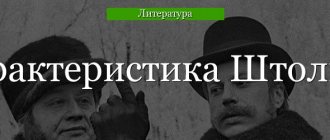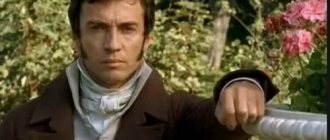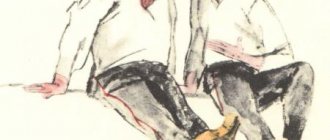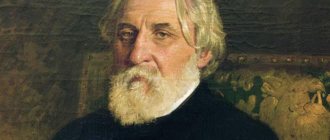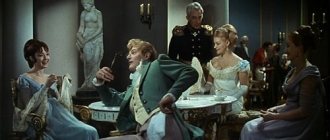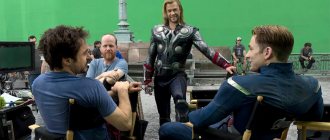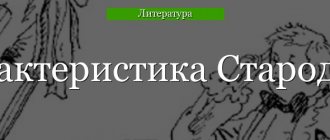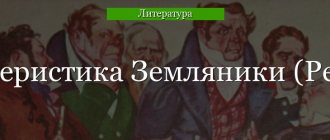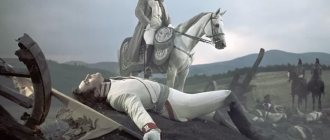Character history
Lev Nikolaevich Tolstoy managed not only to diversify the literary world with a new work, which is original from the point of view of genre composition, but also invented bright and colorful characters. Of course, not all regulars at bookstores have read the writer’s cumbersome novel from cover to cover, but most know who Pierre Bezukhov, Natasha Rostova and Andrei Bolkonsky are.
WAR AND PEACE IMAGE OF ANDREY BOLKONSKY
Introducing readers to Andrei Bolkonsky
, Tolstoy paints a portrait of his hero. Prince Andrei Bolkonsky was small in stature, a very handsome young man with definite and dry features. In Scherer's salon, where we first meet him, he has a tired, bored look, often "a grimace spoils his handsome face." But when Pierre approached him, Bolkonsky “smiled with an unexpectedly kind and pleasant smile.”
When talking with Pierre, “his dry face kept trembling with the nervous revival of every muscle; the eyes, in which the fire of life had previously seemed extinguished, now shone with a radiant bright shine.” And so everywhere and always: dry, proud and cold with everyone who is unpleasant to him (and he is unpleasant to careerists, soulless egoists, bureaucrats, mental and moral nonentities), Prince Andrei is kind, simple, sincere, frank, with simple faces, alien to any falsehood and lies. He respects and appreciates those in whom he sees serious inner content.
Prince Andrey is a richly gifted person. He has an extraordinary mind, distinguished by a penchant for serious, deep work of thought and introspection; At the same time, he is completely alien to daydreaming and the “foggy philosophizing” associated with it. However, this is not a dry, rational person. He has a rich spiritual life, deep feelings. Prince Andrei is a man of strong will, an active, creative nature, he strives for broad social and state activities. This need is supported in him by his inherent ambition, the desire for fame and power. It should be said, however, that Prince Andrei is incapable of bargaining with his conscience. He is honest, and his desire for glory is combined with a thirst for selfless achievement.
A complex and deep nature, Prince Andrei lives in a period of social excitement that gripped the educated circles of the nobility during the Patriotic War, in the atmosphere in which the future Decembrists were formed. In such an environment, the deep, sober mind of Prince Andrei, enriched with a variety of knowledge, critical of the surrounding reality, seeks the meaning of life in activities that would bring him moral satisfaction.
The war awakened ambition in him. Napoleon’s dizzying career makes him dream of his “Toulon,” but he thinks of winning it not by avoiding dangers at headquarters, but in battle, with his courage. This is what Prince Andrei does at Austerlitz. But after being seriously wounded at Austerlitz, he experiences a sharp mental reaction: he becomes convinced of the pettiness of his ambitious goals.
Under the influence of everything he experienced in the war, Prince Andrei falls into a gloomy, depressed mood and experiences a severe mental crisis. In a conversation with Pierre, who visited him in Bogu-charov at this time, he, irritable and nervous, develops in front of his interlocutor a theory of life that is completely unusual for him. “Living for yourself, now avoiding these two evils (remorse and illness) - that’s all my wisdom now.” But Pierre does not believe this “wisdom” - and rightly so: all the qualities of Prince Andrey and his life practice (measures to improve the life of the peasants, their partial liberation) contradict this.
The meeting with Natasha in Otradnoye brought me back to life. He developed a need for broad government activities. He goes to St. Petersburg and meets here with the most prominent figure of the era - Speransky. But soon the nature of Speransky, a man of a cold mind, repels him. He felt the falseness in Speransky - and his illusions about the possibility of fruitful activity among the bureaucrats and court parties dissipated. He experiences disappointment again.
Prince Andrei has a great will to life, and to life specifically with people: “It is necessary that life should not be for me alone, so that it is reflected on everyone and that everyone lives with me.”
The danger looming over the country transformed Prince Andrei. The patriotism of Prince Andrei is clearly formulated in his words spoken the day before by Borodin: “The French have ruined my house and are going to ruin Moscow, they have insulted and are insulting me every minute. And Timokhin and the entire army think so. We must execute them."
The path of Prince Andrei is the path of gradual rapprochement with the people. He sees his main purpose in serving the people. Prince Andrei takes care of his peasants: he lists several hundred of his serfs as “free cultivators” (that is, he sets them free, giving them land), for others he replaces corvee with quitrent, etc.
When the Patriotic War began, Prince Andrei voluntarily joined the army. He refuses to serve on the staff of the “person of the sovereign.” He is convinced that only service in the active army will give him the confidence that he will be useful in the war. Having received command of the regiment, Prince Andrei becomes even closer to the people. “In the regiment they called him our prince, they were proud of him and loved him.” Thus, ordinary Russian soldiers played the main role in the spiritual renewal of Prince Andrei.
A serious wound received on the Borodino field interrupts the activities of Prince Andrei. But his inquisitive thoughts continue to work during his illness. Lying at the dressing station, he sums up his life's journey.
Prince Andrei passionately wants to live, and at the same time he thinks: “But isn’t it all the same now?.. And what will happen there (that is, after death.) and what was there? Why did I feel sorry to part with my life? There was something in this life that I did not understand and do not understand.”
And in these moments, a fiery thought dawns on him about the enormous, universal, all-forgiving love for people that he would have brought if he had remained alive.
But Prince Andrey was not destined to recover from his wound. In Yaroslavl, where the Rostovs transported him, he realized that he was dying. In semi-delirium, in hours of suffering solitude, he painfully thinks about what eternal love is, and comes to the realization that it requires renunciation of life: “To love everyone, to always sacrifice oneself for love meant not to love anyone, it meant not to live this earthly life." This was a clear sign of a mental breakdown.
However, when Natasha was next to him again, Prince Andrei again returned to the thought of life and earthly love. “Everything that exists, everything exists only because I love,” he reasons. Thus, two contradictory statements struggle in his soul: love is life and love is death.
The second one wins. “His soul was not in a normal state,” explains the author. Prince Andrei ultimately comes to an idealistic understanding of love and death: “Love is God, and to die means for me, a particle of love, to return to a common and eternal source.” He himself understood that there was something missing in these thoughts, that in them “there was something one-sided, personal, mental - there was no obviousness.”
Shortly before his death, he had a difficult dream. In a dream, he again fights for life, experiencing a painful fear of death. But death wins even in a dream, and Prince Andrei wakes up with the thought that death is liberation. With this thought he dies.
His dying thoughts are the thoughts of a man broken by illness and suffering, unusual for the sober mind of Prince Andrei. The spiritual appearance of Prince Andrei is characterized not by these dying reflections, colored by mysticism, but by his inquisitive, sober, materialistic mind, his desire for social activity, his love for the people, the struggle for whose happiness he would have devoted his life if he had not died from a wound. Death cut short his quest.
The spiritual appearance of Prince Andrei and all his activities give the right to assume that if he had remained alive, his quest would have led him to the camp of the Decembrists.
ZERCHANINOV A.A.
Andrei Nikolaevich Bolkonsky - according to information from https://ru.wikipedia.org/wiki/Andrei_Bolkonsky:
- L. N. Tolstoy Works: “War and Peace”
- Nationality Russian
- Age: 32 years
- Date of birth: January 12, 1780
- Date of death: 1812
- Family: Father - Prince Nikolai Bolkonsky; sister - Princess Marya Bolkonskaya
History of character creation
According to Kovrov local historian and journalist Nikolai Frolov, one of the two prototypes of Prince Andrei Bolkonsky was a young officer of the guards regiment, Pyotr Mikhailovich Volkonsky, who at the decisive moment of the Battle of Austerlitz led the attack of the reserve battalion. The second prototype is Prince Dmitry Nikolaevich Golitsyn. In the civil service, Chief Chamberlain Golitsyn, during the invasion of Napoleonic army, entered the Akhtyrsky Hussar Regiment as a major. In a general battle he received a mortal wound and after surgery was sent to Vladimir. He died on September 20, 1812, aged 31. He was buried at the Church of the Ascension.
| “WAR AND PEACE” ANALYSIS OF THE NOVEL → |
- LANGUAGE OF THE NOVEL WAR AND PEACE
LANGUAGE OF THE NOVEL WAR AND PEACE Language of the novel. Tolstoy's style represents a further development...
- TOLSTOY IN V.I. LENIN’S ASSESSMENT
TOLSTOY IN V.I. LENIN’S ASSESSMENT Tolstoy’s creative activity lasted about sixty...
- THE DEATH OF TOLSTOY
THE DEATH OF TOLSTOY On October 28, 1910, on one of the dark, damp autumn nights, 82-year-old Tolstoy...
- TOLSTOY'S REALISM
REALISM OF TOLSTOY Gorky said about Tolstoy that his works “were written with a terrible, almost...
- ANNALYSIS OF THE NOVEL RESURRECTION
ANALYSIS OF THE NOVEL RESURRECTION Novel The novel “Resurrection” was written by Tolstoy in the 90s “Resurrection”...
History of creation
In 1856, Lev Nikolaevich Tolstoy began work on his immortal work. Then the master of words thought about creating a story that would tell readers about the Decembrist hero, forced to return back to the Russian Empire. The writer unwittingly moved the scene of the novel to 1825, but by that time the protagonist was a family-owned and mature man. When Lev Nikolaevich thought about the hero’s youth, this time involuntarily coincided with 1812.
Lev Nikolaevich Tolstoy
1812 was not an easy year for the country. The Patriotic War began because the Russian Empire refused to support the continental blockade, which Napoleon saw as the main weapon against Great Britain. Tolstoy was inspired by those troubled times, and besides, his relatives participated in these historical events.
Therefore, in 1863, the writer began working on a novel that reflected the fate of the entire Russian people. In order not to be unfounded, Lev Nikolaevich relied on the scientific works of Alexander Mikhailovsky-Danilevsky, Modest Bogdanovich, Mikhail Shcherbinin and other memoirists and writers. They say that in order to find inspiration, the writer even visited the village of Borodino, where the army of Napoleon Bonaparte and the Russian commander-in-chief Mikhail Kutuzov clashed.
Napoleon Bonaparte and Mikhail Kutuzov
Tolstoy worked tirelessly for seven years on his fundamental work, writing five thousand draft sheets and creating 550 characters. And this is not surprising, because the work is endowed with a philosophical character, which is shown through the prism of the life of the Russian people in an era of failures and defeats.
However, the author, showing the spiritual explorations of the characters, was skeptical about his creation. In 1871, Afanasy Fet received a letter where Lev Nikolaevich wrote:
“How happy I am... that I will never write verbose rubbish like “War” again.”
No matter how critical Tolstoy was, the epic novel War and Peace, published in 1865 (the first excerpt appeared in the Russian Messenger magazine), was a widespread success among the public. The work of the Russian writer amazed both domestic and foreign critics, and the novel itself was recognized as the greatest epic work of new European literature.
Collage illustration for the novel “War and Peace”
The literary diaspora noted not only the exciting plot, which is intertwined in both “peaceful” and “war” times, but also the size of the fictional canvas. Despite the large number of characters, Tolstoy tried to give each hero individual character traits.
Description of Andrei Bolkonsky
“...Short stature, a very handsome young man with certain dry features,” is how Lev Nikolaevich Tolstoy describes his hero when the reader first meets him at Anna Pavlovna Sherer’s evening. “Everything in his figure, from his tired, bored look to his quiet, measured step, represented the sharpest contrast with his little, lively wife.
Apparently, everyone in the living room was not only familiar to him, but he was so tired of it that looking at them and listening to them was very boring for him...” Most of all, the young man was bored when he saw his wife’s face.
It would seem that nothing at this evening could lift the young man’s spirits, and he perked up only when he saw his friend Pierre Bezukhov. From this we can conclude that Andrey values friendship.
The young Prince Bolkonsky is characterized by such qualities as nobility, respect for elders (it is enough to see how he loved his father, calling him “You, father ...”), as well as education and patriotism.
There will come a time of difficult trials in his destiny, but for now he is a young man who is loved and accepted by secular society.
Thirst for fame and subsequent disappointment
Andrei Bolkonsky's values gradually change throughout the novel War and Peace. At the beginning of the work, an ambitious young man strives at all costs to gain human recognition and glory as a brave warrior. “I love nothing but fame, human love. Death, wounds, loss of family, nothing scares me,” he exclaims, wanting to go to war with Napoleon.
We invite you to familiarize yourself with the “characteristics of the Rostov family” in Leo Tolstoy’s novel “War and Peace”
Social life seems empty to him, but the young man wants to be useful to society. At first he serves as Kutuzov’s adjutant, but in the Battle of Austerlitz he is wounded and ends up in the hospital. The family considers Andrei missing, but for Bolkonsky himself this time has become very important for reassessment of values. The young man is disappointed in his former idol Napoleon, seeing him as a worthless man rejoicing in the death of people.
“At that moment Napoleon seemed to him such a small, insignificant person in comparison with what was now happening between his soul and this high, endless sky with clouds running across it.” Now that Bolkonsky’s goal in life - to achieve fame and recognition - has collapsed, the hero is overcome by strong emotional experiences.
Dear readers! Here you can familiarize yourself with “The image and characteristics of Natasha Rostova, the main character of Leo Tolstoy’s novel “War and Peace”
Having recovered, he decides not to fight anymore, but to devote himself to his family. Unfortunately, this did not happen.
Another shock
The next blow for Andrei Bolkonsky was the death during childbirth of his wife Elizabeth. If it were not for the meeting with his friend Pierre Bezukhov, who tried to convince him that life is not over, and he needs to fight, despite the trials, it would have been much more difficult for the hero to survive such grief. “I live and this is not my fault, therefore, I need to live until death somehow better, without interfering with anyone,” he lamented, sharing his experiences with Pierre.
But, thanks to the sincere support of a comrade, who convinced his friend that “you have to live, you have to love, you have to believe,” the hero of the novel survived. During this difficult period, Andrei not only gained courage in his soul, but also met his long-awaited love.
Characteristics of Andrei Bolkonsky
Andrei Bolkonsky is the main character in Leo Tolstoy's novel War and Peace. It is known that many characters in this work have a real prototype, for example, the writer “created” Natasha Rostova from his wife Sofia Andreevna and her sister Tatyana Bers. But the image of Andrei Bolkonsky is collective. Among the possible prototypes, researchers name Nikolai Alekseevich Tuchkov, lieutenant general of the Russian army, as well as staff captain of the engineering troops Fyodor Ivanovich Tizenhausen.
Andrei Bolkonsky with his father
It is noteworthy that the writer initially planned Andrei Bolkonsky as a minor character, who later received individual traits and became the main character of the work. In the first drafts of Lev Nikolayevich Bolkonsky was a secular young man, while in subsequent editions of the novel the prince appears before readers as a male intellectual with an analytical mind, who sets an example of courage and courage for fans of literature.
Moreover, readers can trace from start to finish the formation of the personality and the change in the character of the hero. Researchers classify Bolkonsky as one of the spiritual aristocracy: this young man is building a career, leading a social life, but he cannot be indifferent to the problems of society.
Andrei Bolkonsky at the ball
Andrei Bolkonsky appears before readers as a handsome young man of small stature and with dry features. He hates secular hypocritical society, but comes to balls and other events for the sake of decency:
“He, apparently, not only knew everyone in the living room, but was so tired of them that he found it very boring to look at them and listen to them.”
Bolkonsky is indifferent to his wife Lisa, but when she dies, the young man blames himself for being cold to his wife and not paying her due attention. It is worth noting that Lev Nikolaevich, who knows how to identify man with nature, reveals the personality of Andrei Bolkonsky in the episode where the character sees a huge dilapidated oak tree on the edge of the road - this tree is a symbolic image of the internal state of Prince Andrei.
Andrei Bolkonsky at war
Among other things, Lev Nikolayevich Tolstoy endowed this hero with opposite qualities; he combines courage and cowardice: Bolkonsky participates in a bloody battle on the battlefield, but in the literal sense of the word he is running from an unsuccessful marriage and a failed life. The protagonist either loses the meaning of life, then again hopes for the best, building goals and means to achieve them.
Andrei Nikolaevich revered Napoleon, he also wanted to become famous and lead his army to victory, but fate made its own adjustments: the hero of the work was wounded in the head and taken to the hospital. Later, the prince realized that happiness does not lie in triumph and laurels of honor, but in children and family life. But, unfortunately, Bolkonsky is doomed to failure: not only the death of his wife awaits him, but also the betrayal of Natasha Rostova.
General characteristics of Andrey
Andrei Bolkonsky, one of Leo Tolstoy’s favorite characters, appears before the reader almost at the beginning of the novel. Tolstoy characterizes Bolkonsky in the novel “War and Peace” as a gifted person with a rich inner world and a heightened sense of honor. Bolkonsky is a man of extraordinary intelligence, prone to constant analysis of both external and internal, spiritual events. Not averse to egoism at the beginning of the work, Prince Andrei gravitates towards state activities, he longs for fame and recognition - but not for himself, but for the good of the Russian people. This confused, lost inner guide, but deeply honest patriot and true nobleman, throughout the entire work is looking for himself, the meaning of life, answers to the difficult questions that the current situation poses to him.
The first description of Bolkonsky in the novel “War and Peace” speaks at once about both the appearance and the inner world of the hero: “... Prince Bolkonsky was small in stature, a very handsome young man with definite and dry features. Everything in his figure, from his tired, bored look to his quiet, measured step, represented the sharpest contrast with his little lively wife...” However, he does not fit into secular society or his own family. And all because Andrei, as a man of honor, cannot become part of a world ruled by pretense, affectation and false patriotism. Unlike the “mannequins” around him in beautiful outfits. He considers his wife, whom our contemporaries would call a “socialite,” to be a doll without a soul and a brain.
"War and Peace"
The action of the novel, which tells about friendship and betrayal, begins at a visit to Anna Pavlovna Scherer, where the entire high society of St. Petersburg gathers to discuss politics and Napoleon’s role in the war. Lev Nikolaevich personified this immoral and deceitful salon with the “Famus society”, which was brilliantly described by Alexander Griboedov in his work “Woe from Wit” (1825). It is in Anna Pavlovna’s salon that Andrei Nikolaevich appears before readers.
After dinner and idle talk, Andrei goes to the village to visit his father and leaves his pregnant wife Lisa at the family estate Bald Mountains in the care of his sister Marya. In 1805, Andrei Nikolaevich went to war against Napoleon, where he acted as Kutuzov’s adjutant. During the bloody battles, the hero was wounded in the head, after which he was taken to the hospital.
Princess Marya Bolkonskaya and Prince Andrei Bolkonsky
Upon returning home, Prince Andrei received unpleasant news: his wife Lisa died during childbirth. Bolkonsky plunged into depression. The young man was tormented by the fact that he treated his wife coldly and did not show her due respect. Then Prince Andrei fell in love again, which helped him get rid of his bad mood.
This time, Natasha Rostova became the young man’s chosen one. Bolkonsky proposed marriage to the girl, but since his father was against such a misalliance, the marriage had to be postponed for a year. Natasha, who could not live alone, made a mistake and began an affair with a lover of wild life, Anatoly Kuragin.
Dying Andrei Bolkonsky and Natasha Rostova
The heroine sent Bolkonsky a letter of refusal. This turn of events wounded Andrei Nikolaevich, who dreams of challenging his opponent to a duel. To distract himself from unrequited love and emotional distress, the prince began to work hard and devoted himself to service. In 1812, Bolkonsky took part in the war against Napoleon and was wounded in the stomach during the Battle of Borodino.
Meanwhile, the Rostov family moved to their Moscow estate, where the war participants are located. Among the wounded soldiers, Natasha Rostova saw Prince Andrei and realized that love had not faded in her heart. Unfortunately, Bolkonsky’s poor health was incompatible with life, so the prince died in the arms of the astonished Natasha and Princess Marya.
Who is Andrei Bolkonsky
For the first time in the novel, Andrei Bolkonsky appears at Anna Pavlovna Sherer's party, where other important characters from the novel are present. There he was with Lisa, his pregnant wife. Soon they go to the estate of Bolkonsky's father in Bald Mountains. There, Lisa remains in the care of Bolkonsky’s father and younger sister, while Andrei himself leaves for the 1805 war with Napoleon.
Andrei takes part in the Battle of Austerlitz, in which he is wounded in the head. Once with the French, he ends up in their hospital, but soon returns to his homeland. At home he finds his wife dying in childbirth.
Bolkonsky begins to blame himself for treating Lisa too coldly. He falls into severe depression, after which he falls in love with Natasha Rostova. After their engagement, Andrei postpones marriage for a year and goes abroad; That's what his father wants. After some time, he receives a letter from Natasha, in which she refuses him: Rostova fell in love with someone else, namely Anatoly Kuragin. Another big disappointment is coming in Bolkonsky’s life. He wants to challenge Anatole to a duel, but does not do so. In order not to fall into final depression, he devotes himself to service.
Andrei Bolkonsky takes part in the War of 1812, including the Battle of Borodino. During this battle he is seriously wounded in the stomach. Among the other wounded, he notices Anatoly Kuragin, his longtime rival. Bolkonsky forgives him and no longer holds a grudge against him. During the move, the wounded Andrei Bolkonsky accidentally encounters the Rostov family, who decided to take him under their wing. Natasha asks him for forgiveness, she repents of leaving him. He forgives her, but he fails to survive: Bolkonsky dies.
Film adaptations and actors
Leo Nikolayevich Tolstoy’s novel has been filmed more than once by eminent directors: the work of the Russian writer has been adapted for avid film fans even in Hollywood. Indeed, the number of films based on this book cannot be counted on one hand, so we will list only a few films.
"War and Peace" (film, 1956)
In 1956, director King Vidor brought Leo Tolstoy's work to television screens. The film differs little from the original novel. No wonder the original script was 506 pages, which is five times the size of the average text. Filming took place in Italy, with some episodes filmed in Rome, Felonica and Pinerolo.
Mel Ferrer as Andrei Bolkonsky
The brilliant cast includes recognized Hollywood stars. Natasha Rostova was played by Audrey Hepburn, Henry Fonda played Pierre Bezukhov, and Mel Ferrer played the role of Bolkonsky.
"War and Peace" (film, 1967)
Russian filmmakers have not lagged behind their foreign colleagues, who amaze viewers not only with the “picture”, but also with the scope of their budget. Director Sergei Bondarchuk worked for six years on the highest-budget film in the history of Soviet cinema.
Vyacheslav Tikhonov as Andrei Bolkonsky
In the film, film fans see not only the plot and acting, but also the director’s know-how: Sergei Bondarchuk used panoramic battles, which were new for that time. The role of Andrei Bolkonsky went to actor Vyacheslav Tikhonov. Also starring in the film were Lyudmila Savelyeva, Kira Golovko, Oleg Tabakov, Anastasia Vertinskaya, Nikolai Trofimov and others.
"War and Peace" (TV series, 2007)
German director Robert Dornhelm also took up the film adaptation of Leo Tolstoy's work, peppering the film with original storylines. Moreover, Robert departed from the canons in terms of the appearance of the main characters, for example, Natasha Rostova (Clemence Poesy) appears to the audience as a blonde with blue eyes.
Alessio Boni as Andrei Bolkonsky
The image of Andrei Bolkonsky went to the Italian actor Alessio Boni, who is remembered by film fans for the films “The Robbery” (1993), “After the Storm” (1995), “Dracula” (2002) and other films.
"War and Peace" (TV series, 2016)
According to The Guardian, residents of Foggy Albion began buying the original manuscripts of Leo Nikolayevich Tolstoy after this series, filmed by director Tom Harperm.
James Norton as Andrei Bolkonsky
The six-episode adaptation of the novel shows viewers love relationships, devoting almost no time to military events. The role of Andrei Bolkonsky was played by James Norton, sharing the set with Paul Dano and Lily James.
Portrait of Andrei Bolkonsky
We meet Bolkonsky at the evening of Anna Pavlovna Scherer. L.N. Tolstoy gives him the following description: “...short stature, a very handsome young man with certain dry features.” We see that the prince’s presence at the evening is very passive. He came there because it was supposed to: his wife Lisa was at the evening, and he had to be next to her. But Bolkonsky is clearly bored, the author shows this in everything “... from a tired, bored look to a quiet, measured step.”
In the image of Bolkonsky in the novel “War and Peace,” Tolstoy shows an educated, intelligent, noble secular man who knows how to think rationally and be worthy of his title. Andrei loved his family very much, respected his father, the old Prince Bolkonsky, called him “You, father...” As Tolstoy writes, “... cheerfully endured his father’s ridicule of new people and with visible joy called his father to a conversation and listened to him.” He was kind and caring, although he may not seem like that to us.
Interesting Facts
- Lev Nikolaevich did not consider his cumbersome work finished and believed that the novel “War and Peace” should end with a different scene. However, the author never brought his idea to life.
- In the film War and Peace (1956), the costume designers used more than one hundred thousand sets of military uniforms, costumes and wigs, which were made from original illustrations from the time of Napoleon Bonaparte.
- The novel “War and Peace” traces the author’s philosophical views and pieces from his biography. The writer did not like Moscow society and had mental vices. When his wife did not fulfill all his whims, according to rumors, Lev Nikolaevich walked “to the left.” Therefore, it is not surprising that his characters, like any mortals, have negative traits.
- King Vidor's film did not gain fame among the European public, but it gained unprecedented popularity in the Soviet Union.
Image and characteristics of Andrei Bolkonsky
After reading Leo Nikolayevich Tolstoy’s novel “War and Peace,” I was greatly impressed. Of course, I was amazed by how accurately and individually many of the characters were portrayed. How different they all are, and what interesting people and beautiful images in their own way. But there is one character who became a moral and human role model for me. Even if he is endowed with not only positive qualities, but what makes a person different is that he is not ideal. So, we will talk about Andrei Bolkonsky.
This hero has the title of prince, is brilliantly educated, and has external beauty. If we characterize his internal qualities, we can say that he is a person of a deep mindset, he has a sense of pride, he always strives to achieve his goals, and has a real soul. Bolkonsky is a very brave hero, both on the battlefield and in peaceful life. He always openly conveys his thoughts, defends his point of view, and can go against others. He is not characterized by heat and rashness; he always thinks about his steps and actions. He shows interest in philosophy, and he is not alien to thoughts about the meaning of life and existence.
As for wartime, Andrei shows bravery and courage, and is not afraid to look death in the face. Yes, at first Napoleon was his idol, he admired him. But then disappointment sets in, after which Bolkonsky is ready to help his homeland, no matter what it costs him, he was a true patriot.
Bolkonsky is also capable of sincere love. The beautiful Natasha Rostova gave him hope for a new life. She showed him that nothing human is alien to him either. Unfortunately, this utopia did not last long. Andrey cannot forgive Natalya for her intrigues with Kuragin. After this, he sees no meaning in life.
As a friend, Bolkonsky is shown only from the good side. His real friend is Pierre Bezukhov. He never turned away from him, although in Bezukhov’s society, to put it mildly, they did not like him.
Of course, I was a little disappointed by the death of this hero; I would like to see his future life and fate. But such is life, and we saw that it is not limited only to black and white, and for Andrei it was just like that. The hero's personality was truly multifaceted. Before us was brilliantly presented the image of a nobleman at his best. This hero combines three wonderful components: he was a good warrior, a decent person and a worthy family man, although the author does not idealize his hero.
This is one of the most important characters in this work.
Other topics: ← What was the fate of the heroes? in the story Prisoner of the Caucasus ↑ Tolstoy The Rostov family in the novel War and Peace →
`
Quotes
“The battle is won by the one who is determined to win it!”
“I remember,” Prince Andrei hastily answered, “I said that a fallen woman must be forgiven, but I did not say that I can forgive. I can't".
"Love? What is love? Love prevents death. Love is life. Everything, everything that I understand, I understand only because I love. Everything is, everything exists only because I love. Everything is connected by one thing. Love is God, and to die means for me, a particle of love, to return to the common and eternal source.”
“Let’s leave the dead to bury the dead, but while you’re alive, you must live and be happy.”
“There are only two sources of human vices: idleness and superstition, and there are only two virtues: activity and intelligence.”
“No, life is not over at the age of 31, suddenly it’s finally over,” Prince Andrei certainly decided. “Not only do I know everything that is in me, it is necessary for everyone to know it: both Pierre and this girl who wanted to fly into the sky, it is necessary for everyone to know me, so that my life is not for me alone.” life, so that they don’t live so independently of my life, so that it is reflected on everyone, and so that they all live with me!”
Character traits of Andrei Bolkonsky in the novel “War and Peace”
(401 words) Lev Nikolaevich is famous for his writing skills. He skillfully described the most diverse personalities in his epic novel, however, I believe that the most striking of them is Prince Andrei Bolkonsky.
Why? It is through his example that we see how different a person can be, how closely tenderness and anger can be intertwined in him, how the good in his personality intersects and interacts with the bad. Andrei Bolkonsky is not a negative or positive character. He is somewhere in between, like any person. He is the same as us - he is looking for himself, he is looking for something that will give him a new love for life and people. This is what makes him a favorite of many readers, despite the fact that at first he may seem like a negative hero to us.
For the first time we encounter Andrei Bolkonsky at a reception with Anna Pavlovna Scherer. The author describes him as a short, graceful and handsome man, but what sets him apart is his “tired, bored look.” Andrey is disgusted by the world, he has no sympathy for stupid and false women, hypocritical conversations. At balls and receptions, he behaves dryly, sometimes even rudely - he turns away from the women who speak to him: “Look how he treats the ladies! She talks to him, but he turns away.” However, we see that he is not a bad person, such as when he is at A.P. Scherer meets Pierre, the author writes that Andrei’s face is immediately touched by a smile. This means that he is not devoid of kindness and love in his heart, but he does not let everyone see it. In addition, when he falls in love with Natasha, he is sensitive and caring, he really loves her, just as he loves his son from his first wife, despite the fact that he cannot spend much time with both his son and Natasha. He also loves his father, Nikolai Andreevich Bolkonsky, to whom all his life he unconsciously tries to prove that he is a worthy son. It is because of his father that he is so drawn to war and his sense of duty is so pronounced. In addition, they are generally very similar, except that Andrei was softer and, unlike his father, still allowed himself to love and believed in this feeling.
However, love played a cruel joke on Andrei Bolkonsky.
After the betrayal of Natasha, who chose Anatoly Kuragin, the prince goes to war for the last time. It is in this part of the story that we see the reborn personality of Andrei Bolkonsky. At the end of his days, he understands all the truths that he has been pursuing all his life. Thus, Leo Tolstoy shows readers that one day we will all come to a common awareness and understanding of life, but it is better not to chase after something dubious, because it may be too late. Interesting? Save it on your wall!

